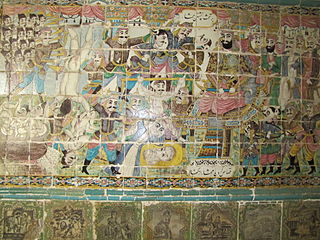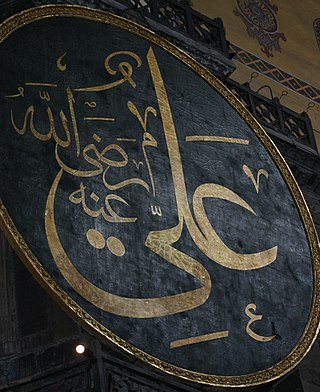Mukhtar Ali may refer to:
- Mukhtar Ali (footballer, born 1962), Pakistani footballer
- Muktar Ali (born 1989), Bangladeshi cricketer
- Mukhtar Ali (born 1997), Saudi Arabian footballer
Mukhtar Ali may refer to:
Mansour ; also spelled Mounsor, Monsur (Bengali), Mansoor, Manser, Mansur, Mansyur (Indonesian) or Mensur (Turkish), is a male Arabic name that means "He who is victorious", from the Arabic root naṣr (نصر), meaning "victory."

Ali ibn al-Husayn al-Sajjad, also known as Zayn al-Abidin was the great-grandson of the Islamic prophet Muhammad, and the fourth imam in Shia Islam, succeeding his father, Husayn ibn Ali, his uncle, Hasan ibn Ali, and his grandfather, Ali ibn Abi Talib.
Mukhtar meaning "chosen" in Arabic: المختار, is the head of a village or mahalle (neighbourhood) in many Arab countries as well as in Turkey and Cyprus. The name is given because mukhtars are usually selected by some consensual or participatory method, often involving an election. Mukhtar is also a common name. In Arab countries it is more often a surname (laqab), whilst in non-Arab Muslim countries it is common as a first name (ism).

Al-Mukhtar ibn Abi Ubayd al-Thaqafi was a pro-Alid revolutionary based in Kufa, who led a rebellion against the Umayyad Caliphate in 685 and ruled over most of Iraq for eighteen months during the Second Fitna.
Mohamed Haji Mukhtar is a Somali scholar and writer currently in the United States.

Muhammad ibn al-Hanafiyya was a son of Ali ibn Abi Talib, who was the fourth caliph in Sunni Islam and the first imam in Shia Islam. Ibn al-Hanafiyya was an effective lieutenant for his father Ali during his caliphate. After the assassination of Ali and the deaths of his two sons Hasan and Husayn, many recognized Ibn al-Hanafiyya as the head of the House of Ali. Claiming to represent Ibn al-Hanafiyya, Mukhtar al-Thaqafi rose in Iraq in 686 to avenge Husayn and his relatives, who were massacred in 680 CE by forces of the Umayyad caliph Yazid bin Mu'awiya. The quiescent Ibn al-Hanafiyya did not actively associate with this rebellion but was still rescued by Mukhtar when he was detained by the rival caliph Ubayd Allah ibn Ziyad. Support for Ibn al-Hanafiyya continued even after the defeat and death of Mukhtar in 686–687 in the form of the Kaysanites, a now-extinct Shia sect that traced the imamate to Ibn al-Hanafiyya and his descendants, particularly his son Abu Hashim. After the death of Ibn al-Hanafiyya in 700–701, some Kaysanites declared that he was the Mahdi, the eschatological Islamic leader who would reappear in the end of time and eradicate injustice and evil. The Kaysanites later provided the organizational structure for the Abbasids to overthrew the Umayyads in 750–751.
Abdullahi is a male given name also common as a surname. It is a variation of the Arabic personal name Abdullah. The variant Abdullahi is most common in Nigeria, Saudi Arabia, Somalia, and Ethiopia.
ʿAbbes is an old Arabic name that means "Lion". The name traces back to Al-‘Abbas ibn ‘Abd al-Muttalib in 536 CE and Abbas ibn Ali, a son of Ali ibn Abi Talib, who participated in the battle of Karbala alongside his brother Husayn ibn Ali. Abbas ibn Ali is revered by Muslims, some of whom are named Abbas in remembrance and tribute to him. There is an Arabian tribe of the same name, the Banu Abbas.
Mukhtar al-Bakri is a Yemeni-American who grew up in the suburbs of Buffalo, New York. In 2002, he was arrested and charged as part of the War on Terror together with the other members of the "Lackawanna Six", based on the fact the group of friends had attended an Afghan training camp together years earlier.
The 2012 AFF Championship qualification tournament was the qualification process for the 2012 AFF Championship, the ninth edition of the ASEAN Football Championship. It was held in Yangon, Myanmar from 5 to 13 October 2012, and involved the five lower ranked teams in Southeast Asia. The format was a single round-robin tournament with the top two teams qualifying for the tournament proper.

Hany Abubakr Mukhtar is a German professional footballer who plays as an attacking midfielder for Nashville SC in Major League Soccer.

The Mukhtar Army is a Shi'a Iraqi militia group formed in February 2013 by Wathiq al-Battat, a former senior official in the Hezbollah Brigades. Al-Battat pledged his loyalty to the Supreme Leader of Iran, Ayatollah Ali Khamenei. Al-Battat was arrested briefly on 2 January 2014 but was released despite still being a fugitive. He was allegedly "accidentally assassinated" at point-blank range on 20 December 2014 at a fake police checkpoint in eastern Iraq by an unknown party but has since been reported alive and has appeared in the public eye.

Almahdi Ali Mukhtar is a Qatari footballer who plays as a defender for Al-Wakrah and Qatar national football team. He became the sixth Aspire Academy graduate to play for Qatar's senior national team after he made his debut in a friendly match against Egypt on 28 December 2010.

The 23rd Arabian Gulf Cup was the 23rd edition of the biennial football competition for the eight members of the Arab Gulf Cup Football Federation. It took place in Kuwait from 22 December 2017 until 5 January 2018. Oman won their second title, defeating the United Arab Emirates in the final on penalties following a goalless draw.
Shahin Frashëri was an Albanian bejtexhi of the 19th century. His Mukhtarnameh poem is one of the longest and earliest epics in Albanian literature.
Mukhtar Ahmed may refer to:
Mukhtar Abdullahi Ali is a Saudi Arabian professional footballer who plays as a midfielder for the Saudi Arabia national team and for Al-Nassr. He was born in Jeddah and moved to London as an infant.
Ansari or Al Ansari is a typically Muslim surname mainly found in the Middle East and South Asia. People with the surname Al-Ansari or Ansari are said to be the descendants of the Ansar tribesmen of Medina. Notable Ansaris include:
Abū ʿAmra Kaysān was a prominent Persian mawlā during the Second Muslim Civil War.